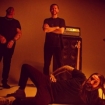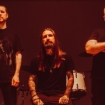Keith Buckley, the longtime frontman for Buffalo metalcore mainstays Every Time I Die, has just returned from a vacation at his in-laws' home in Florida. It's late spring, and upstate New York's extended winter season is mercifully just starting to thaw — but Buckley is damned determined to put you right back into a blizzard's chill with Watch, his genuinely discomforting second novel.
The follow-up to his 2016 debut, Scale, Watch (which arrives this August via Rare Bird Books) centers on John Harvey, a man who smashes his wrist watch after deciding, following the death of his child and subsequent suicide of his wife, to be unbound to the concept of time. It's a tale informed by the real-life shock the Buckley's experienced at the end of 2015 when pregnancy complications nearly took the lives of wife Lindsay and their then-unborn child, Zuzana.

Much like the lyrics on Every Time I Die's most recent album, 2016's Low Teens, Buckley channeled the terror and confusion surrounding the nearly fatal situation into his latest tome. Contrasting the ultimately good fortune of the Buckley's, Watch's broken John Harvey spends the novel stumbling snow-blind between his house and a local bar as once-crystallized memories begin to blur into a painful, amorphic mess. It all makes for a dangerously discombobulating read, one that leaves the reader unsteady as they turn each page. Buckley wouldn't have it any other way.
"I wanted to make this book feel eerie. When you can't trust the person telling the story, and you can't trust that person's memory, you feel disconnected," Buckley summarizes of using an unreliable narrator. "Safety is something that, whether we admit to it or not, is something we're looking to gain after every experience we gain. Even if it's to scare ourselves, like with a horror movie, we like to know that it's going to end, and we're eventually going to return to safety. I think taking away that certainty — that everything is going to work out — is one of the most terrifying things that could possibly happen. Obviously, that's informed by the thing that happened with my wife and child."
In light of his character's plunge into a self-reflective abyss, Revolver asked Buckley to go over his own history as writer, from falling in love with grunge-period poets to transforming personal pain into prose.
HOW DID YOU GET YOUR START WITH WRITING?
KEITH BUCKLEY I just admired lyrics, as any kid does. I was moved by music so much. It wasn't the instrumentation, it was really the power of the lyrics. I wanted to do that! I remember reading Pearl Jam lyrics. Really, Eddie Vedder seemed enlightened. I still think that about him. It was cool that I was young and impressionable when they were coming up. I realized that lyricists were writers, and started looking into literature a little bit more, and focusing on English in high school. I just loved what people could do with words.
GOING FROM THE LYRICS OF EDDIE VEDDER INTO AUTHORS, WHO WERE SOME OF YOUR EARLIEST INSPIRATIONS?
I was really big into Beat culture growing up. I just liked the spontaneous prose of it. It felt so much more natural, it felt like the way people talk. Obviously in high school you're supposed to like Shakespeare, John Dunne, and Chaucer. Spontaneous prose was a different side to the coin. It doesn't have to be the most formal language available — people don't use that, really.
THERE'S A DECADENCE AND GRIT THAT'S IN A LOT OF BEAT CULTURE, TOO. HOW HAS THAT SEEPED INTO YOUR WRITING?
It paired up really well with my interest in punk rock and hardcore. I mean, obviously it's less polished. You know, hardcore bands and punk bands, you don't hear them on the radio, you don't see their videos on MTV, but it exists out there. It's really personal and touching. I felt the same way with the beat writers.
ARE YOU A PULP FAN AT ALL? IN ALL OF THEIR ALBUMS, THERE'S A DISCLAIMER FROM JARVIS COCKER SAYING, 'PLEASE DO NOT READ THE LYRICS WHILST LISTENING TO THE RECORDINGS'. IT'S PART OF THE AURAL EXPERIENCE, BUT ALSO A SEPARATE LITERARY EXPERIENCE. I'M WONDERING IF THAT IDEA APPLIES AT ALL TO YOUR WRITING, AS THE SINGER OF EVERY TIME I DIE?
I didn't know that they did that, but that's very apt. When I was really young, I used to rewrite Nirvana lyrics. It would be the same cadence, but I would sing my own lyrics. I obviously didn't have anybody to be in a band with, and I really wanted to write lyrics. When I did finally get a band going, it was important to me that the lyrics could stand alone ... [that] it could be read as a piece of literature. It's crazy, because my publisher, Rare Bird, they're going to release the Low Teens lyrics. They will actually read separate from the music! I'm curious to see how people react to it.
CONSIDERING THAT THE DELUXE EDITION OF WATCH INCLUDES A BOUND BOOK OF LOW TEENS LYRICS, HOW ARE THOSE TWO PIECES ENTWINED IN YOUR MIND?
They're not, really, to be quite honest. I was very hesitant when this idea was proposed, because I don't want to be like, "I'm a writer, but also, in case you don't like my writing, here are some lyrics that I have done in this time-tested band." I want to be seen as someone who doesn't just write books on the side, just a guy in the band writing stories. I think it could definitely fill in the blanks for people, [but] It is a little weird.
CAN YOU EXPLAIN THE DIFFERENT HEADSPACES AND ROUTINES YOU GET INTO FOR THESE TWO KINDS OF WRITING?
I think I'm a lot more forgiving [when] writing lyrics, in that some of the lyrics aren't exactly the best thing I've ever written. That's OK, because they don't have to be. I'm not the band! There's guitar work to admire, and drums, and song structure. There are other things going on that can shine. When you're writing a book, there's nothing to fall back on. There's no ground to stand on. You're weaving this thing under yourself and hoping that it supports you. You just really have to trust your instincts. I'm getting better at that, I think.
SCALE FOCUSED ON A STRUGGLING INDIE-ROCK MUSICIAN. IN WATCH, THE CHARACTER OF GUY IS ANOTHER MUSICIAN WAITING TO BE DISCOVERED, AND HE ISN'T LOOKED AT FAVORABLY BY THE NARRATOR. YOU YOURSELF HAVE CARVED OUT A SUCCESSFUL CAREER IN THE MUSIC INDUSTRY, BUT THESE ARE TWO FAIRLY NEGATIVE SCENARIOS.
I'm in no position to lie and pretend that this is some incredibly blessed, luxurious life. We're in a hardcore band that still travels in a van and sleeps in shitty hotels. That's the truth of it. Do I think that the return on what we get is proportionate to the work we put in? Probably not, I think we've worked really hard. Sometimes you see bands that have been around for 20 years and they're like the fucking Rolling Stones. They're on private jets right now! There's a frustration there that I'm not ever going to deny having. I just kind of put that into both characters.
THAT'S JUST ONE WAY YOU'VE PUT YOUR LIFE'S EXPERIENCE INTO YOUR BOOKS. WITH WHAT HAPPENED WITH YOUR WIFE AND CHILD IN MIND, CAN YOU TALK ABOUT UNDERSTANDING TRAUMA, AND CHANNELING THAT INTO YOUR ART.
I'm hesitant to ever use the word "lucky," as far as that situation goes, but the fact that I did have this band and had something to make sense of it all was hugely important to me. I feel like Low Teens was a very dark and uncertain period. That uncertainty is absolutely what Watch is all about. It's about misperceptions, and fake memories. It's an elaboration on never really knowing what you're looking at, never really being sure that what you're seeing is real.
Because, being in that situation with my wife and child, your brain is your biggest enemy. You're not sure what you can believe, or who you believe. That's basically what inspired the idea for Watch. It's about a guy named John who gets stuck in a snowstorm, and he's confronting all these ghosts throughout his life that he's run from, because he was too afraid to confront them. Now he's lost in this storm, and he's forced to reconcile.
THE CHARACTER OF JOHN IS A DRUNK, AND AN ANGRY ONE AT TIMES. YOU'VE TALKED OPENLY ABOUT WORKING THROUGH YOUR OWN SOBRIETY — THROUGH WRITING HIS CHARACTER DID YOU HAVE ANY NEW PERSONAL INSIGHTS IN REGARDS TO YOUR RELATIONSHIP WITH ALCOHOL, AND UNDERSTANDING THE DARKER PARTS OF YOURSELF?
It's definitely not the friend it used to be. I was very affected by the idea of things just coming at me out of nowhere, at any hour of the day — a phone call from the hospital, a phone call from whoever. I became nervous about not being aware and in control, or being able to go at a moment's notice. I have that hesitation now when I drink. I started to realize, "If I know that I'm not going to be having fun when I drink, then what's the point?" Then it's just to cope, and that gets really depressing.
HOW FOCUSED DO YOU FEEL NOW?
I feel really good. I used to talk about how I could be drunk to write lyrics, but I can't even imagine being even slightly buzzed while writing and editing. I mean, it's literally me in a quiet room focusing on this. I write completely sober now, all the time. I enjoy that so much more.












